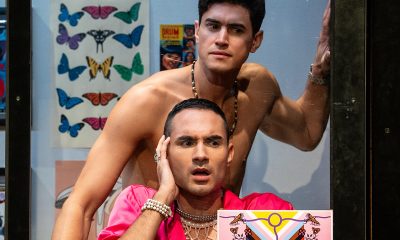a&e features
Kathleen Turner tackles ‘Magical Thinking’
Stage and screen icon channels Joan Didion in new Arena Stage production
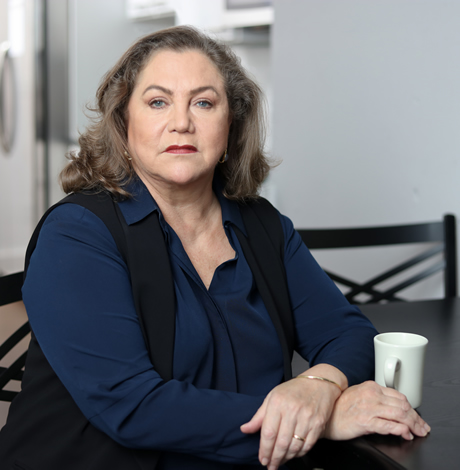
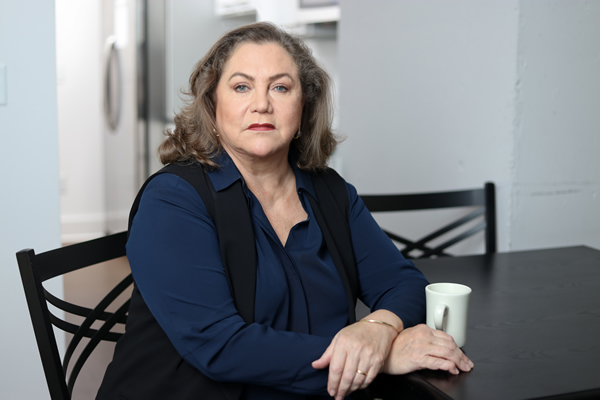
Kathleen Turner as Joan Didion in ‘The Year of Magical Thinking’ at Arena Stage. Turner says the work helped her deal with the loss of her mother. (Photo by Tony Powell; courtesy Arena Stage)
‘The Year of Magical Thinking’
By Joan Didion
Arena Stage
Arlene and Robert Kogod Cradle
1101 Sixth St., S.W.
Oct. 7-Nov. 20
$40-90
Kathleen Turner has done one-woman plays before — she played Tallulah Bankhead in “Tallulah” in 2000-2001 and the title role in “Red Hot Patriot: the Kick-Ass Wit of Molly Ivins” at Arena Stage in 2012.
But this time, it’s different. For her latest production — Turner has become almost as well known in recent years for her stage work as her film roles, which date back to 1981’s “Body Heat” — Turner will play legendary author Joan Didion, whose stunningly frank 2005 memoir “The Year of Magical Thinking” told of the aftermath of the loss of her husband, the author John Gregory Dunne who died suddenly in 2003.
The “magical thinking” of the title refers to the phenomenon of the mind in deep stages of grief where rational thought is sometimes circumvented as a coping mechanism. Didion wrote that at times she felt she couldn’t give away Dunne’s shoes, for surely he’d need them upon returning. Didion won the National Book Award in 2005 for the book, something of a career capstone for the author, known for California-centric writing in works like “Slouching Towards Bethlehem” and “The White Album” as well as screenplays she wrote with Dunne.
Didion adapted the book to the stage in 2007 with Vanessa Redgrave. Turner spoke to the Blade last week by phone from Washington where she was in early rehearsals for the Gaye Taylor Upchurch-directed Arena version.
WASHINGTON BLADE: Tell us how you discovered this work and how things are going so far.
KATHLEEN TURNER: We’ve only had one full-day rehearsal, so I think it’s much too soon to say how anything’s going although we had a very nice open reading, just a table reading, the first day that I enjoyed. I was aware of the book, you know, years ago when it was published but I had not thought of it or seen it as a play at all and then I was, well, my mother passed, my mother died last year and it was, oh, it was a life-changing experience. We were close. We had a really wonderful relationship and I knew how much I would miss her. So trying to figure out how all that was going to change, what I could do, how I could handle it and then, of course, I had thought again of “The Year of Magical Thinking” and went back to look at it and discovered the play version and thought, “Well, this is really what I want to put my heart into now.”
BLADE: How old was your mom?
TURNER: Ninety-three so we had a good long time together.
BLADE: Have you met Joan Didion?
TURNER: Yes, I have met Joan over the years. I’ve been in New York and in this business for a very long time now. I think next year will be 40 years that I’ve been doing this professionally. But she’s very frail now. She’s not very well. She won’t be involved, I’m sorry to say, with this.
BLADE: I’ve never met her but she strikes me as very small. A bit of a waif, perhaps, even when she was younger.
TURNER: Oh, not the woman’s mind, honey. No, no, no. This is one of the strongest minds, with the most ruthless thinking. I mean, she’s so clear headed. She says, “To say this correctly and to some of us, myself included, correctness is a big ego point.” She’s very specific. It’s so amazing to see this brilliant mind who locks down details and chooses words so specifically, so exactly, that this mind could adapt and adopt a whole other way of thinking, of reality, it’s extraordinary.
BLADE: I was thinking more in physical terms. She seems rather demure and you seem so formidable. I only know the book, but it doesn’t strike me as obvious casting.
TURNER: Well certainly physically we’re not at all alike. She’s a tiny little thing, but this is not an imitation. I’m not pretending to be Joan Didion in that way. I just don’t really understand. You think I’ll be less believable for that reason? That they’ll expect to see some little waif?
BLADE: No, I just wondered if that sort of factored into your approach at all or where your head is in tackling this.
TURNER: No. I don’t think of Joan’s physicality at all.
BLADE: Great books don’t always adapt well to the stage. How do you feel this adaptation works?
TURNER: No, not necessarily at all, do they. I think the biggest challenge for this, of course, is the incredibly specific word choices that she makes. I really don’t want to fall into any pattern of approximation, of saying words like the words she chose. This is a huge challenge because there’s so much material but I believe there’s a real reason for her word choices. And part of the thing about magical thinking is that it doesn’t really make sense, some of it. It’s not exactly logical, so to follow it, to follow this path of thinking sometimes is a bit challenging.
BLADE: How does it feel returning to Arena?
TURNER: I love being back here, I really do. It’s just such high quality and I love the people. The production values are great, the people are terrific to work with. I actually really like Washington these days. And I’m happy to be here during the election season so that on my days off or during my days once we’re in performance, I might be able to, oh, I don’t know, raise a little hell you know?
BLADE: What was it like doing Molly Ivins during the last election cycle? That must have been fun.
TURNER: Oh, it was great are you kidding? We had to keep cramming in I don’t know how many seats we actually got into the theater. I think we broke all records and had to extend the run as I recall. It was great. I had a ball doing it.
BLADE: Are D.C. audiences different in any perceptible way?
TURNER: One of the things I’ve noticed over the years is that D.C. audiences seem more integrated. I see more non-white, or whatever the correct wording would be, than I do in a lot of other theaters. I like that. It’s a professional class and not based on race.
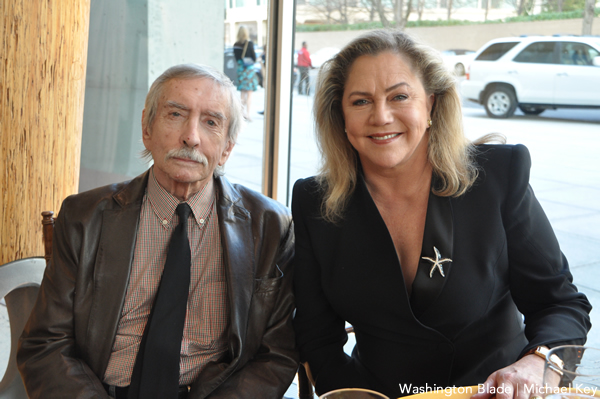
Edward Albee with Kathleen Turner in Washington in 2011. Albee said Turner brought Martha in his play ‘Virginia Woolf’ alive in a way he hadn’t felt since Uta Hagen originated it in the ‘60s. (Washington Blade file photo by Michael Key)
BLADE: I’m almost certain you’re supporting Hillary, right?
TURNER: Of course I’m supporting Hillary. Anything else I think is absolutely unthinkable. I think she’ll be an extraordinary executive in chief. She’s proven that. It’s just such a bizarre time. I just read a wonderful column in the New York Times — I’m trying to think if it was David Brooks or who it was — but the point that seemed so perfect to me was that you can take a die-hard Donald Trump supporter and say, “Donald Trump said this, but here are the actual facts. You know, this is absolutely incorrect. It’s absolutely a lie” and the Trump supporter would probably say, “Well, I don’t feel it’s a lie.” Somewhere along the way in our time, how you feel became just as important as the actual facts or even the idea that they are equatable, you know? I just find that extraordinary, but it’s the only explanation I think.
BLADE: So is that a manner of magical thinking of its own perhaps? Is there a correlation there?
TURNER: There may be. But if you follow Joan’s path of coping, she exposes it to us as magical thinking and there I think is the difference because I don’t think they know they’re doing any sort of magical thinking.
BLADE: Where were you when you heard about the Supreme Court ruling on same-sex marriage last year and how did you feel?
TURNER: I was home in New York City. I’m on the board of People for the American Way for, I think, 31 years now I’ve been working with them and we had a large effort out country wide to support this decision. It was thrilling. Absolutely thrilling.
BLADE: Does any filming experience stand out in your mind as especially memorable?
TURNER: Oh darling, all these years (laughs). Well I always used to love, before I got rheumatoid arthritis, I used to love doing as much of my own stunts as they would allow. I was always just throwing myself around. I always enjoyed things like the adventure films, you know. Things like “Romancing the Stone” or something, they were just such fun for me.
BLADE: How is your daughter and what is she doing these days?
TURNER: She is very well, thank you for asking. She has decided to go back to school and work on pre-law, she says.
BLADE: The line in “Serial Mom” where you berate the woman for her white shoes has become such a gay quotable line. How do you really feel about white shoes after Labor Day?
TURNER: (laughs) Actually no, I won’t wear white shoes after Labor Day. But more than that, I won’t wear white shoes period. I think it’s kind of upstaging. I don’t want people looking at my feet. I just don’t think they’re classy, frankly.
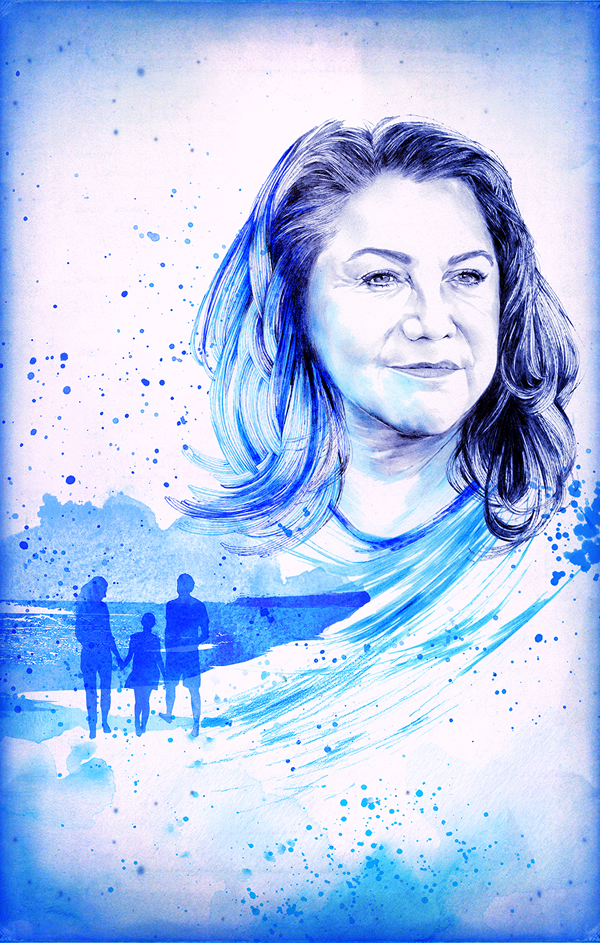
An illustration for Arena Stage’s production of ‘The Year of Magical Thinking’ starring Kathleen Turner as Joan Didion. (Illustration by Montse Bernal; courtesy Arena Stage)
a&e features
From Prohibition to Pride: Queering the District podcast reveals local LGBTQ history
The new podcast explores the hidden history and enduring impact of queer spaces in Washington, D.C.
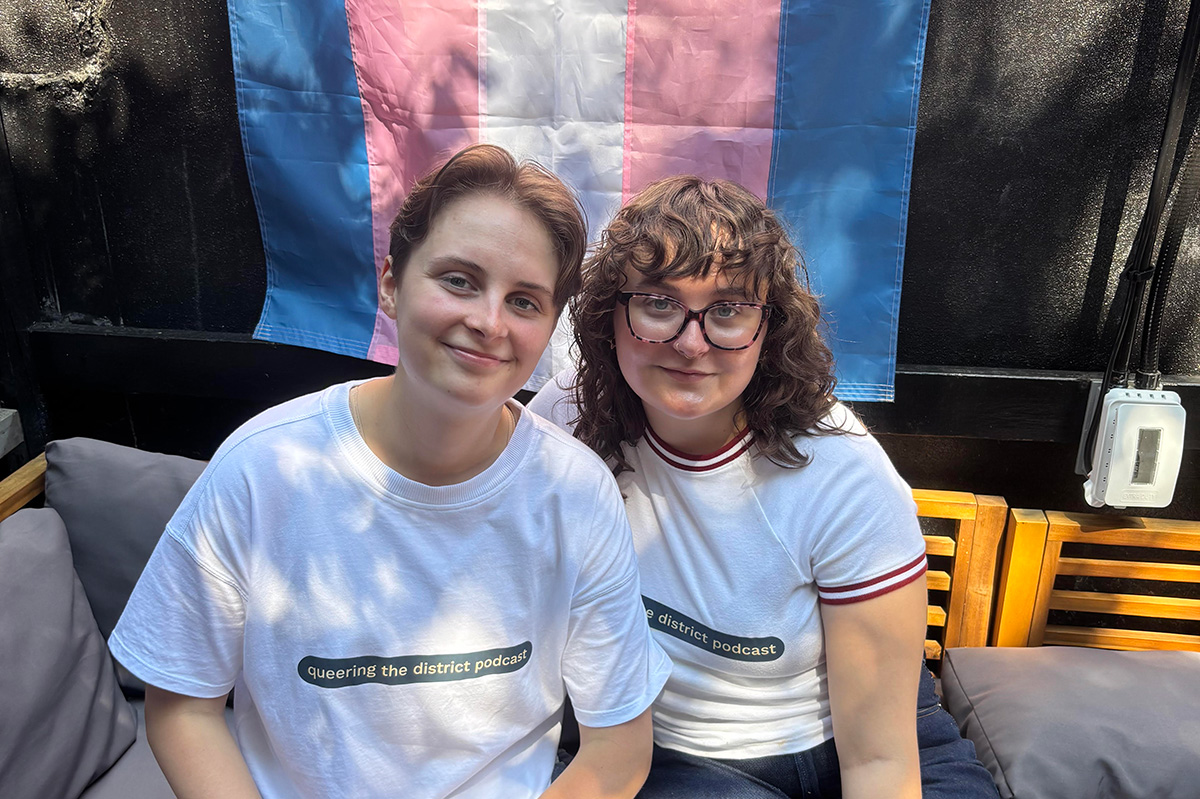
On June 25, as Pride month inched toward its end, three queer creators launched an ambitious project to honor the spaces that built D.C.’s LGBTQ community—and connect them to today’s queer life. The first episode of their podcast, Queering the District, hit streaming platforms that day, aiming to spotlight what host and co-creator Abby Stuckrath calls “third places”: bars, clubs, and gathering spots that have served as hubs for queer life across the city.
Each episode of the 10-part series delves into a different piece of D.C.’s queer past—from landmark clubs to untold personal stories—told through the voices of drag legends, activists, DJs, historians, and patrons who lived it. The show also threads together personal experiences from today’s community, bringing the listener on an auditory journey from Prohibition-era speakeasies to contemporary nights out at places like As You Are or Saints & Sinners.
Abby Stuckrath, alongside her sibling Ellie Stuckrath, and producer Mads Reagan, make up the podcast’s creative team. A recent journalism graduate of American University, Abby told the Blade that her passion for queer storytelling began during college—and that D.C. itself played a defining role in shaping her queer identity.
“I went to American University. I graduated last year and studied journalism. When I was in school, I always wanted to focus on queer stories – especially in D.C., because I’m from Denver, Colorado, I’ve never lived in a place like this before. D.C. has always just kind of been a place I call home when it comes to my queer identity.”
But breaking into the media to tell those stories wasn’t easy. Stuckrath quickly learned that editorial support—and funding—for queer-focused projects is limited. So she decided to do it her own way.
“I kind of found out that if you want to tell stories, you kind of have to do it on your own– especially when it comes to queer stories. There’s not a lot of people begging for us to talk about queer people and to pay you for it. So I was like, ‘Okay, let’s just do it on my own.’”
The idea for the podcast first took root in conversations with Ellie, Abby’s sibling and biggest supporter. Ellie had also moved to D.C. to find more space to explore and express their queer and gender identities. Together, the two began shaping a vision that would combine storytelling, sound design, and grassroots community input.
“I was like, ‘I don’t know what exactly I want to do yet, but I want it to be queer, and I want it to be about D.C., and it’s going to be called Queering the District, and we’re going to find out what that means.’ And Ellie is my biggest supporter, and my best friend. And they were like, ‘Hell yeah. Like, let’s do this.’ And so we decided to just do it together.”
The name stuck—and so did the mission. The team began researching queer D.C. history and found a city overflowing with stories that had rarely been documented, especially in mainstream archives.
“We started looking up the history of queer culture in D.C., and it kind of just clicked from there,” Stuckrath said. “I did not know anything about how rich our history is in the city until one Google search, and then I just kept learning more and more. I was kind of pissed because I studied gender studies in school in D.C. and didn’t learn shit about this.”
Season one focuses on the role of third places—non-work, non-home spaces where queer people could gather, exist fully, and build community.
“Third places have always been the epicenter of queer life… places outside of just your own personal home, because sometimes that isn’t a safe place. And of course, the work most commonly in the past and still today, isn’t a safe place for queer people to be full of themselves. So like, bars were the first place for queer people to really thrive and meet each other.”
To make the show participatory, Queering the District includes a twist: a voicemail line where anyone can call in and share a memory or question. The team calls the phone “Fifi”—a nod to the kind of retro guestbooks often used at weddings, but reimagined for queer nightlife and history.
“We wanted to find a way for people to share their stories with us anonymously… so even though we start in Prohibition, we wanted to connect it to now—like, those people who were singing jazz to each other in a white queer bar are connected to you singing karaoke on a Sunday night at your favorite gay bar. We’re all interconnected by this third place of queer bars in D.C.”
Those connections are emotional as well as historical. While building the series, one realization hit Stuckrath particularly hard: the immense loss of queer spaces in D.C., especially in neighborhoods that have since been heavily redeveloped.
“Every time I go to a Nats game, I think about, well, this just replaced five gay bars that used to be here. It used to be the home of Ziegfeld’s… Tracks, which was almost 2,000 square feet, with a volleyball court in the back, a fire pit, and iconic light show. I just didn’t know that we had that, and it made me sad for the queer elders that are in our city now who walk the streets and don’t see all those places they used to call home.”
That sense of loss—alongside the joy and resilience of queer community—is what the show aims to capture. As the podcast continues, Abby hopes it serves as both a celebration and an educational tool, especially for young LGBTQ people arriving in D.C. without realizing the queer foundations they’re walking on.
“D.C. is a unique city, and specifically young queer people who are hoping to move to the city—to know that you’ve got to know your history to be here. I hope this serves as an easier way for you to consume and learn about queer history, because queer history defines how we move in life.”
And for all the voices still left out, Abby is clear: this podcast is an open door, not a final word.
“This is a perfectly imperfect podcast. We should just be a starting point. We shouldn’t be the ending point.”
New episodes of Queering the District drop every Wednesday on all major platforms.
a&e features
Doug Spearman takes his chance
‘Noah’s Arc: The Movie’ debuted on Paramount+ last month

There’s no question that when Patrik-Ian Polk’s series “Noah’s Arc” premiered on Logo 20 years ago, it was a groundbreaking creation. The story of a group of Black gay men and their wonderful friendship. The titular arc was that of the cute main character, Noah (Darryl Stephens), and his close-knit circle of friends, including Chance played by gay actor Doug Spearman. This compelling and loving fraternity may, in fact, be what brought viewers back repeatedly, including a 2008 movie, “Noah’s Arc: Jumping the Broom,” as well as the 2020 “Noah’s Arc” short, and now, a new full-length feature “Noah’s Arc: The Movie,” debuting on Paramount+ on June 20. In the movie, filled with equal measures of laughs and tears, Chance, who has faced a devastating loss, finds his dependable friends there, ready to support and comfort him at a moment’s notice. I had the pleasure of speaking with Spearman the morning of the streaming premiere of “Noah’s Arc: The Movie.”
WASHINGTON BLADE: Doug, since the early 2000s, when the “Noah’s Arc” series premiered on Logo, you have been playing the character of Chance, including in the latest installment, “Noah’s Arc: The Movie.” What was it about Chance that appealed to you as an actor?
SPEARMAN: When Patrik (-Ian Polk) called me to ask me to play him (Chance), I was at JFK airport in the baggage claim, waiting for a suitcase. He explained what the part was. The thing that stuck out to me was the fact that Chance was in a long-term relationship with another Black man. And, they had a child; they had a 4-year-old daughter named Kenya. I had never seen two Black gay men raise a child on TV before. I thought it was the most revolutionary thing I’d ever seen. I immediately thought I’ve got to do this because that was something nobody had seen. I thought it was incredibly important to take the part.
BLADE: “Noah’s Arc: The Movie” was, once again, written and directed by Patrik-Ian Polk, who you just mentioned, is the creator of the entire franchise. What’s the secret to your long-standing working relationship?
SPEARMAN: [Laughs] the whole team, all of us, are like a band of brothers. We fight like brothers, we come together like brothers, we hash things out, we talk, because we’re all very different from our characters. I think the challenge of playing these guys and then uplifting these men, playing a part, especially something written by Patrik, is like solving a math equation. There’s always a challenge that’s enjoyable for me as an actor: to try to find out what it is that Patrik wants, and then how do I do it.
BLADE: I think you do a very good job of it.
SPEARMAN: Thank you very much
BLADE: In the years between “Jumping the Broom” and the new full-length movie, many changes have occurred, and the story addresses some of them, including gay widowhood, which is something that the aging community is now confronting, as well as mental health issues. Please say a few words about how you approached those subjects in the new movie.
SPEARMAN: I had a lot of loss in my life, right before we started shooting. Two months before we started shooting the first series, my mother died. I was going through the grief process through that whole first season. Since then, I’ve lost a lot of people in my life. In fact, when we started shooting the second season, the second week we were shooting, my ex died of a heart attack. I was having to fold that into what I was doing with my life on the set and off the set. You’ve got to show up and you’ve got to do your work. The first two seasons of “Noah’s Arc” are always tinged with the memory of grief. So, when I had to deal with the death that Chance faces (in the new movie), which is a significant death in his life, it wasn’t that hard to reach back, especially the scene in the graveyard. It was something that I unfortunately could pull from personal experience.
BLADE: Shifting gears, the movie features delightful cast surprises, including Jasmine Guy and TS Madison. Did you have a chance to interact with either or both when they were on set?
SPEARMAN: No, I didn’t have any scenes with Jasmine, and I missed her. I wish I had gotten to see her because I actually got to direct Jasmine for a CBS promo shoot for “Queen,” back in the early ‘90s. I had a huge crush on her when she was on “A Different World.” So, I really would have liked to reconnect. But TS and I got to see each other every day because I was in all her scenes. It was extraordinary being around somebody like that. That is one outspoken woman!
BLADE: Even though Beyoncé never makes an appearance in the movie, there’s a lot of talk about her. Would you say you are a Beyoncé fan?
SPEARMAN: Yes! I’m breathing! Yes, I’m a Beyoncé fan. I actually got the chance to meet her. I knew her mom. Her mom was extraordinary to me. She is in the second movie I directed. She also gave us a wedding gown to use in the very first scene of the movie. That family is extraordinarily important to me. Not only just to be a fan, but to be somebody who’s gotten to know them and work with them and see how hard they work. I don’t think anybody works as hard as Tina or Beyoncé.
BLADE: There was a recent news item about gay actor Benito Skinner of the Amazon Prime series “Overcompensating” being told not to bother auditioning for straight roles. As an out actor yourself, how important do you think it is for queer characters to be portrayed by queer actors, and vice versa?
SPEARMAN: Being queer is a multifaceted identity. There’s no one kind of queer person. I think finding the best actor that’s your first circle of casting. I think one of the joys about being an actor is that you get to play different parts. I play straight guys all the time. Dads and husbands and things like that. I think a lot of people are told not to do it. In fact, I wouldn’t be Chance if the actor who was originally cast as Chance hadn’t been pulled out of the series by his agents because they didn’t want him to play a gay character.
BLADE: That’s amazing! Thank you for sharing that. Without giving away too much, the ending of the movie is a little ambiguous, even ending with a question mark. If there was a “Noah’s Arc: The Movie” sequel, would you come back for that?
SPEARMAN: Yeah! A lot of it would depend on what Chance’s journey is going to be like. Patrik and I have conversations like that all the time. He’s very interested and supportive of input. I hope I would be, as we all would be, part of the creative growth with these characters. They live in Patrik’s head, and he writes them, but we’re the ones who have to flesh them out. It’s a conversation, it’s always a conversation.
BLADE: You are currently performing in Molière’s “The Imaginary Invalid” as part of the New Orleans Shakespeare Festival at Tulane. What has this experience been like for you?
SPEARMAN: It’s extraordinary! I started on stage when I was seven. There’s nothing like working with a live audience and having that immediacy. I’m working with an extraordinarily talented cast in a really great play, and I have some of the best scene partners I could ever want.
BLADE: Are there any upcoming film or TV projects you’d like to mention?
SPEARMAN: I’m still a writer, and I’m still a director, and I’ve still got scripts that I would like to make. I have a little something that’s a cross between “Treme” and “Bridgerton” that I want to do. I’m always trying to figure out what the next thing is.
a&e features
Visit Cambridge, a ‘beautiful secret’ on Maryland’s Eastern Shore
New organization promotes town’s welcoming vibe, LGBTQ inclusion

CAMBRIDGE, Md. — Driving through this scenic, historic town on Maryland’s Eastern Shore, you’ll be charmed by streets lined with unique shops, restaurants, and beautifully restored Victorian homes. You’ll also be struck by the number of LGBTQ Pride flags flying throughout the town.
The flags are a reassuring signal that everyone is welcome here, despite the town’s location in ruby red Dorchester County, which voted for Donald Trump over Kamala Harris by a lopsided margin. But don’t let that deter you from visiting. A new organization, Proudly Cambridge, is holding its debut Pride event this weekend, touting the town’s welcoming, inclusive culture.
“We stumbled on a beautiful secret and we wanted to help get the word out,” said James Lumalcuri of the effort to create Proudly Cambridge.
The organization celebrates diversity, enhances public spaces, and seeks to uplift all that Cambridge has to share, according to its mission statement, under the tagline “You Belong Here.”
The group has so far held informal movie nights and a picnic and garden party; the launch party is June 28 at the Cambridge Yacht Club, which will feature a Pride celebration and tea dance. The event’s 75 tickets sold out quickly and proceeds benefit DoCo Pride.
“Tickets went faster than we imagined and we’re bummed we can’t welcome everyone who wanted to come,” Lumalcuri said, adding that organizers plan to make “Cheers on the Choptank” an annual event with added capacity next year.
One of the group’s first projects was to distribute free Pride flags to anyone who requested one and the result is a visually striking display of a large number of flags flying all over town. Up next: Proudly Cambridge plans to roll out a program offering affirming businesses rainbow crab stickers to show their inclusiveness and LGBTQ support. The group also wants to engage with potential visitors and homebuyers.
“We want to spread the word outside of Cambridge — in D.C. and Baltimore — who don’t know about Cambridge,” Lumalcuri said. “We want them to come and know we are a safe haven. You can exist here and feel comfortable and supported by neighbors in a way that we didn’t anticipate when we moved here.”

Lumalcuri, 53, a federal government employee, and his husband, Lou Cardenas, 62, a Realtor, purchased a Victorian house in Cambridge in 2021 and embarked on an extensive renovation. The couple also owns a home in Adams Morgan in D.C.
“We saw the opportunity here and wanted to share it with others,” Cardenas said. “There’s lots of housing inventory in the $300-400,000 range … we’re not here to gentrify people out of town because a lot of these homes are just empty and need to be fixed up and we’re happy to be a part of that.”
Lumalcuri was talking with friends one Sunday last year at the gazebo (affectionately known as the “gayzebo” by locals) at the Yacht Club and the idea for Proudly Cambridge was born. The founding board members are Lumalcuri, Corey van Vlymen, Brian Orjuela, Lauren Mross, and Caleb Holland. The group is currently working toward forming a 501(c)3.
“We need visibility and support for those who need it,” Mross said. “We started making lists of what we wanted to do and the five of us ran with it. We started meeting weekly and solidified what we wanted to do.”
Mross, 50, a brand strategist and web designer, moved to Cambridge from Atlanta with her wife three years ago. They knew they wanted to be near the water and farther north and began researching their options when they discovered Cambridge.
“I had not heard of Cambridge but the location seemed perfect,” she said. “I pointed on a map and said this is where we’re going to move.”
The couple packed up, bought a camper trailer and parked it in different campsites but kept coming back to Cambridge.
“I didn’t know how right it was until we moved here,” she said. “It’s the most welcoming place … there’s an energy vortex here – how did so many cool, progressive people end up in one place?”
Corey van Vlymen and his husband live in D.C. and were looking for a second home. They considered Lost River, W.Va., but decided they preferred to be on the water.
“We looked at a map on both sides of the bay and came to Cambridge on a Saturday and bought a house that day,” said van Vlymen, 39, a senior scientist at Booz Allen Hamilton. They’ve owned in Cambridge for two years.
They were drawn to Cambridge due to its location on the water, the affordable housing inventory, and its proximity to D.C.; it’s about an hour and 20 minutes away.
Now, through the work of Proudly Cambridge, they hope to highlight the town’s many attributes to residents and visitors alike.
“Something we all agree on is there’s a perception problem for Cambridge and a lack of awareness,” van Vlymen said. “If you tell someone you’re going to Cambridge, chances are they think, ‘England or Massachusetts?’”
He cited the affordability and the opportunity to save older, historic homes as a big draw for buyers.
“It’s all about celebrating all the things that make Cambridge great,” Mross added. “Our monthly social events are joyful and celebratory.” A recent game night drew about 70 people.
She noted that the goal is not to gentrify the town and push longtime residents out, but to uplift all the people who are already there while welcoming new visitors and future residents.
They also noted that Proudly Cambridge does not seek to supplant existing Pride-focused organizations. Dorchester County Pride organizes countywide Pride events and Delmarva Pride was held in nearby Easton two weeks ago.
“We celebrate all diversity but are gay powered and gay led,” Mross noted.
To learn more about Proudly Cambridge, visit the group on Facebook and Instagram.
What to see and do
Cambridge, located 13 miles up the Choptank River from the Chesapeake Bay, has a population of roughly 15,000. It was settled in 1684 and named for the English university town in 1686. It is home to the Harriet Tubman Museum, mural, and monument. Its proximity to the Blackwater National Wildlife Refuge makes it a popular stop for birders, drawn to more than 27,000 acres of marshland dubbed “the Everglades of the north.”
The refuge is walkable, bikeable, and driveable, making it an accessible attraction for all. There are kayaking and biking tours through Blackwater Adventures (blackwateradventuresmd.com).
Back in town, take a stroll along the water and through historic downtown and admire the architecture. Take in the striking Harriet Tubman mural (424 Race St.). Shop in the many local boutiques, and don’t miss the gay-owned Shorelife Home and Gifts (421 Race St.), filled with stylish coastal décor items.
Stop for breakfast or lunch at Black Water Bakery (429 Race St.), which offers a full compliment of coffee drinks along with a build-your-own mimosa bar and a full menu of creative cocktails.
The Cambridge Yacht Club (1 Mill St.) is always bustling but you need to be a member to get in. Snapper’s on the water is temporarily closed for renovations. RaR Brewing (rarbrewing.com) is popular for craft beers served in an 80-year-old former pool hall and bowling alley. The menu offers burgers, wings, and other bar fare.
For dinner or wine, don’t miss the fantastic Vintage 414 (414 Race St.), which offers lunch, dinner, wine tasting events, specialty foods, and a large selection of wines. The homemade cheddar crackers, inventive flatbreads, and creative desserts (citrus olive oil cake, carrot cake trifle) were a hit on a recent visit.
Also nearby is Ava’s (305 High St.), a regional chain offering outstanding Italian dishes, pizzas, and more.
For something off the beaten path, visit Emily’s Produce (22143 Church Creek Rd.) for its nursery, produce, and prepared meals.
“Ten minutes into the sticks there’s a place called Emily’s Produce, where you can pay $5 and walk through a field and pick sunflowers, blueberries, you can feed the goats … and they have great food,” van Vlymen said.
As for accommodations, there’s the Hyatt Regency Chesapeake Bay (100 Heron Blvd. at Route 50), a resort complex with golf course, spa, and marina. Otherwise, check out Airbnb and VRBO for short-term rentals closer to downtown.
Its proximity to D.C. and Baltimore makes Cambridge an ideal weekend getaway. The large LGBTQ population is welcoming and they are happy to talk up their town and show you around.
“There’s a closeness among the neighbors that I wasn’t feeling in D.C.,” Lumalcuri said. “We look after each other.”
-

 Virginia1 day ago
Virginia1 day agoDefying trends, new LGBTQ center opens in rural Winchester, Va.
-

 South Africa4 days ago
South Africa4 days agoLesbian feminist becomes South African MP
-

 Travel3 days ago
Travel3 days agoManchester is vibrant tapestry of culture, history, and Pride
-

 Opinions2 days ago
Opinions2 days agoUSAID’s demise: America’s global betrayal of trust with LGBTQ people





